How Putnam Mystery Writer C. J. Box Wrangles Western Myth and Modern Reality
March 28, 2018
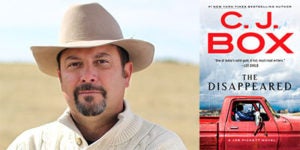 #1 New York Times bestselling author C.J. Box takes his storytelling to new levels in his 18th Joe Pickett novel, THE DISAPPEARED, published by Putnam on March 27. Branded “one of today’s solid gold, A-list, must-read writers” by fellow Penguin Random House author Lee Child, Mr. Box has a remarkable ability to evolve his core characters – game warden Joe Pickett, his wife Mary Beth, their children, and friend Nate Romanowski – while introducing vexing mysteries, unexpected dilemmas, and multi-dimensional forces of nature.
#1 New York Times bestselling author C.J. Box takes his storytelling to new levels in his 18th Joe Pickett novel, THE DISAPPEARED, published by Putnam on March 27. Branded “one of today’s solid gold, A-list, must-read writers” by fellow Penguin Random House author Lee Child, Mr. Box has a remarkable ability to evolve his core characters – game warden Joe Pickett, his wife Mary Beth, their children, and friend Nate Romanowski – while introducing vexing mysteries, unexpected dilemmas, and multi-dimensional forces of nature.
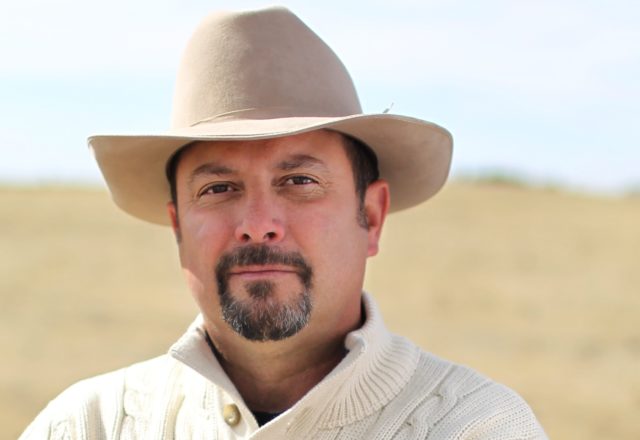 C.J. Box
C.J. Box©Michael Smith[/caption] What accounts for your ability to create so many truly scary but believable villains in your books? I think there’s sometimes a tendency in crime fiction to make the bad guys bad in every conceivable way. I try to avoid that by providing a backstory and (most importantly) motivation for why the bad guys do what they do. I think that helps make them both believable and even more scary because the reader can empathize (a bit, at least) with them. There are instances where Joe Pickett even understands why his antagonist is dangerous and feels sorry for them a little. I guess I’m the same way. With THE DISAPPEARED, you introduce several new plot twists and characters that may surprise your readers. Where did the inspiration for these creations come from? Prior to my books taking off, I worked for over twenty years in the international tourism industry on behalf of five Rocky Mountain states. Part of our job was to promote western experiences to Europeans and others. Dude ranch holidays were particularly popular in the United Kingdom and especially among professional women. I found that fascinating - that very urban women wanted to spend a week or two in the modern west. Part of the appeal, we found, was that a significant number of these women wanted to hook up with a young cowboy. And it happened quite often. That phenomenon was the basis for the new book, where a well-known female executive disappears after visiting a very high-end dude ranch. A luxury “dude ranch,” Silver Creek, figures in the plot of this novel. As a native of Wyoming, do you witness any real-life contention between the intrusion of rich outsiders that such properties bring and the longtime locals? The interaction between wealthy dude ranch guests and locals is a source of fascination to me. Some guests try to pretend they’re cowboys and cowgirls, and some locals play up being natives to the point of caricature. I’ve seen romances develop between overseas visitors and young local wranglers, and I know of a few women who chose to stay with their young cowboy rather than go home. It’s an intersection between western myth and modern reality.
What about the Children? When Parenting, Careers and Class Collide
January 26, 2018
 Leïla Slimani became the first Moroccan woman to win the prestigious French literary prize, the Prix Goncourt, which she received for her novel, THE PERFECT NANNY, a #1 bestseller in France. Now this Penguin Books Original is an Indie Bestseller in the U.S. Both a riveting thriller and a literary exploration of issues of class, modern parenting, and feminism, it captures the sometimes overwhelming isolation of raising young children as well as the financial and emotional strain of navigating careers, costly childcare, social pressures, and personal fulfillment.
Leïla Slimani became the first Moroccan woman to win the prestigious French literary prize, the Prix Goncourt, which she received for her novel, THE PERFECT NANNY, a #1 bestseller in France. Now this Penguin Books Original is an Indie Bestseller in the U.S. Both a riveting thriller and a literary exploration of issues of class, modern parenting, and feminism, it captures the sometimes overwhelming isolation of raising young children as well as the financial and emotional strain of navigating careers, costly childcare, social pressures, and personal fulfillment. 
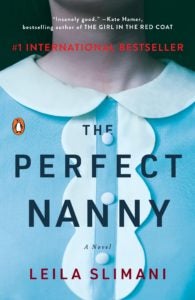 I did not want to write a classical thriller. It’s a specific type of book with its own codes: I did not want the police investigation or the morbid suspense around the likely killing of the children to be the main narrative element. With that time inversion, the reader effectively conducts the investigation himself. The stunning shock of the very first pages is meant to hook the reader and heightens their level of attention. They can then focus on the many different lights I cast on Louise and build their own perspective on what made Louise commit such a hideous act. The book construction “spoils” the ending but creates a very powerful, sometimes uncomfortable tension by placing the reader at the heart of the action.
You’ve said that the character of Louise is influenced in part by your experiences observing your own childhood nanny, whose condition was very isolated, with no family of her own, and at times harbored resentment toward your family because of it. Your portrayal of Louise is sympathetic as often as it is unsettling. What drew you to the idea of writing about a nanny?
I wanted to tell my own experience of being a child who was partly raised by a nanny and a mother who entrusted her child with a nanny. I also wanted to explore to tell the living conditions of a modern family.
I found the complexity and ambiguity of being a nanny interesting. Nannies are women who raise children who are not their own; they create ties by taking care of them, feeding them, loving them—and then eventually, they must leave them. They live in houses they do not own. They share all the intimacy of a family without ever becoming a true member of that family. On top of that, there are the common cultural and social and economic gaps between nannies and the families that employ them.
I wandered a lot in public squares and children playgrounds to effectively observe those nannies at work; they are almost invisible to us and yet they make it possible for us to entertain a working life. I was fascinated by this woman proletariat, and I wanted to some extent shine a light on these forgotten women.
Your first novel, Dans le jardin de l’ogre (IN THE GARDEN OF THE OGRE, forthcoming from Penguin Books), concerns a female sex addict. How do you find your characters?
Tolstoy used to say that Anna Karénina was actually living with him and that was she who dictated the book. It sounds crazy but I think it’s true. A character forces their way into your mind and feelings, becoming a real obsession. Everything then turns around them: the story, the environment, the action. The same happened with Adèle, the main character of Dans le jardin de l’ogre. Following the Dominique Strauss Kahn case (again a true story local to New York City), I wondered, what if a woman had such a sexual addiction? This gave birth to Adèle who then lived with me for some time.
I did not want to write a classical thriller. It’s a specific type of book with its own codes: I did not want the police investigation or the morbid suspense around the likely killing of the children to be the main narrative element. With that time inversion, the reader effectively conducts the investigation himself. The stunning shock of the very first pages is meant to hook the reader and heightens their level of attention. They can then focus on the many different lights I cast on Louise and build their own perspective on what made Louise commit such a hideous act. The book construction “spoils” the ending but creates a very powerful, sometimes uncomfortable tension by placing the reader at the heart of the action.
You’ve said that the character of Louise is influenced in part by your experiences observing your own childhood nanny, whose condition was very isolated, with no family of her own, and at times harbored resentment toward your family because of it. Your portrayal of Louise is sympathetic as often as it is unsettling. What drew you to the idea of writing about a nanny?
I wanted to tell my own experience of being a child who was partly raised by a nanny and a mother who entrusted her child with a nanny. I also wanted to explore to tell the living conditions of a modern family.
I found the complexity and ambiguity of being a nanny interesting. Nannies are women who raise children who are not their own; they create ties by taking care of them, feeding them, loving them—and then eventually, they must leave them. They live in houses they do not own. They share all the intimacy of a family without ever becoming a true member of that family. On top of that, there are the common cultural and social and economic gaps between nannies and the families that employ them.
I wandered a lot in public squares and children playgrounds to effectively observe those nannies at work; they are almost invisible to us and yet they make it possible for us to entertain a working life. I was fascinated by this woman proletariat, and I wanted to some extent shine a light on these forgotten women.
Your first novel, Dans le jardin de l’ogre (IN THE GARDEN OF THE OGRE, forthcoming from Penguin Books), concerns a female sex addict. How do you find your characters?
Tolstoy used to say that Anna Karénina was actually living with him and that was she who dictated the book. It sounds crazy but I think it’s true. A character forces their way into your mind and feelings, becoming a real obsession. Everything then turns around them: the story, the environment, the action. The same happened with Adèle, the main character of Dans le jardin de l’ogre. Following the Dominique Strauss Kahn case (again a true story local to New York City), I wondered, what if a woman had such a sexual addiction? This gave birth to Adèle who then lived with me for some time. How Katie Davis Majors Held On to Hope and Wrote Her Book
October 2, 2017
 In her inspirational new memoir DARING TO HOPE , published by Multnomah on Tuesday, October 3, Katie Davis Majors faces such questions as, “How do you hold on to hope when you don’t get the ending you asked for?” When Katie moved to Uganda more than a decade ago, accidentally founded a booming organization, and later became the mother of thirteen girls through the miracle of adoption, she determined to weave her life together with the people she desired to serve. But joy often gave way to sorrow as she invested her heart fully in walking alongside people in the grip of poverty, addiction, desperation, and disease.
In her inspirational new memoir DARING TO HOPE , published by Multnomah on Tuesday, October 3, Katie Davis Majors faces such questions as, “How do you hold on to hope when you don’t get the ending you asked for?” When Katie moved to Uganda more than a decade ago, accidentally founded a booming organization, and later became the mother of thirteen girls through the miracle of adoption, she determined to weave her life together with the people she desired to serve. But joy often gave way to sorrow as she invested her heart fully in walking alongside people in the grip of poverty, addiction, desperation, and disease.
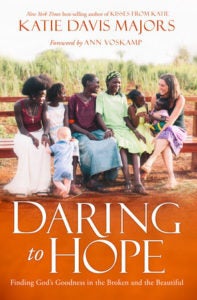 DARING TO HOPE is an invitation to cling to the God of the impossible. Though readers’ heartaches and dreams may take a different shape, they may find their own questions echoed in the book’s pages.
In this “Meet Our Author” interview, Katie delves inside the creation of her book, her writing regimen, working with Multnomah, and what parts of the book she thinks will connect directly with readers.
How and when did you know that the experiences, events and emotions you chronicle in DARING TO HOPE would evolve into a book?
Honestly, the first draft of this book was mostly written on post it notes and little scraps of paper lying around my house. I had no idea a book was forming. I was going through a season of grief and hurt. I had a lot of questions, and I was trying to reconcile my heart and my head, what I knew to be true about people and about God, and what I doubted. When I compiled them together and saw some of the themes, that’s when it occurred to me, maybe I’ve written another book. Still it took several months before I shared it with my agent. It had been six years since my first book, Kisses from Katie, and I was nervous to re-engage public life.
[caption id="attachment_8010" align="alignleft" width="200"]
DARING TO HOPE is an invitation to cling to the God of the impossible. Though readers’ heartaches and dreams may take a different shape, they may find their own questions echoed in the book’s pages.
In this “Meet Our Author” interview, Katie delves inside the creation of her book, her writing regimen, working with Multnomah, and what parts of the book she thinks will connect directly with readers.
How and when did you know that the experiences, events and emotions you chronicle in DARING TO HOPE would evolve into a book?
Honestly, the first draft of this book was mostly written on post it notes and little scraps of paper lying around my house. I had no idea a book was forming. I was going through a season of grief and hurt. I had a lot of questions, and I was trying to reconcile my heart and my head, what I knew to be true about people and about God, and what I doubted. When I compiled them together and saw some of the themes, that’s when it occurred to me, maybe I’ve written another book. Still it took several months before I shared it with my agent. It had been six years since my first book, Kisses from Katie, and I was nervous to re-engage public life.
[caption id="attachment_8010" align="alignleft" width="200"] Katie Davis Majors (middle) on the Today Show with Kathie Lee Gifford (left) and Hoda Kotb (right)[/caption]
How would you describe your writing regimen and the process of creating your narrative voice?
Well, I have fourteen children, one of whom is a baby. And I homeschool. I have an organization I help run that serves people here in Uganda. My writing regimen is like the rest of my life – squeezed in between family and work and everyday living. Unlike Kisses from Katie, I’m married now, so I relied a lot on help from Benji. He would watch the children while I would work. I had writing days, where I would carve out huge chunks of consecutive days to crank out the manuscript. My editor was an amazing support.
What has it been like having Multnomah as your publisher?
I have loved working with Multnomah. They have been supportive, encouraging, and champions for
Katie Davis Majors (middle) on the Today Show with Kathie Lee Gifford (left) and Hoda Kotb (right)[/caption]
How would you describe your writing regimen and the process of creating your narrative voice?
Well, I have fourteen children, one of whom is a baby. And I homeschool. I have an organization I help run that serves people here in Uganda. My writing regimen is like the rest of my life – squeezed in between family and work and everyday living. Unlike Kisses from Katie, I’m married now, so I relied a lot on help from Benji. He would watch the children while I would work. I had writing days, where I would carve out huge chunks of consecutive days to crank out the manuscript. My editor was an amazing support.
What has it been like having Multnomah as your publisher?
I have loved working with Multnomah. They have been supportive, encouraging, and champions for 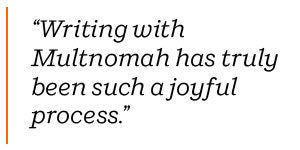 DARING TO HOPE since the very beginning. I feel like they understand this message, understand my heart, and want others to hear it. Some of the people on the team have supported our non-profit organization, and another is an adoptive mother. It’s been extremely collaborative. Writing with Multnomah has truly been such a joyful process. I am grateful.
What elements of DARING TO HOPE do you think will resonate most strongly with readers?
Although some of my specific experiences might be unique, many of the themes of DARING TO HOPE are not. We all have our struggles and our sorrows. I lost a child to an unfair system, but everyone can relate with what it feels like when unfair things happen to them. I prayed and nursed my friend Katherine back to health for months, and I sincerely thought she was getting better, and then she tragically died. I am not the only person out there who has experienced the tragedy of death or loss. I was a single mother of 13 children and I doubted whether I would ever find a man who would be able to join me in my life’s work, as a father to my daughters. Many singles understand this and wonder how their calling is going to fit with a family. I saw that sometimes things work out as you hope and sometimes they do not. I had come to the edge of DARING TO HOPE: Do I really believe in God’s goodness even if the ending turns out differently than I hoped? So many of us know that feeling, of being on the edge, that line between hoping for miracles and fearing disappointments. I hope these words help people feel less alone.
DARING TO HOPE since the very beginning. I feel like they understand this message, understand my heart, and want others to hear it. Some of the people on the team have supported our non-profit organization, and another is an adoptive mother. It’s been extremely collaborative. Writing with Multnomah has truly been such a joyful process. I am grateful.
What elements of DARING TO HOPE do you think will resonate most strongly with readers?
Although some of my specific experiences might be unique, many of the themes of DARING TO HOPE are not. We all have our struggles and our sorrows. I lost a child to an unfair system, but everyone can relate with what it feels like when unfair things happen to them. I prayed and nursed my friend Katherine back to health for months, and I sincerely thought she was getting better, and then she tragically died. I am not the only person out there who has experienced the tragedy of death or loss. I was a single mother of 13 children and I doubted whether I would ever find a man who would be able to join me in my life’s work, as a father to my daughters. Many singles understand this and wonder how their calling is going to fit with a family. I saw that sometimes things work out as you hope and sometimes they do not. I had come to the edge of DARING TO HOPE: Do I really believe in God’s goodness even if the ending turns out differently than I hoped? So many of us know that feeling, of being on the edge, that line between hoping for miracles and fearing disappointments. I hope these words help people feel less alone. How Celeste Ng Writes Novels That Reach Our Inner Selves
September 11, 2017
 Penguin Press author Celeste Ng made an indelible impression on readers when her debut novel, EVERYTHING I NEVER TOLD YOU, was published in 2014. It won the APLA Alex Award for Fiction and was a New York Times Book Review “Editors Choice.” A Times reviewer noted: “If we know this story, we haven’t seen it yet in American fiction, not until now …” This week marks the arrival of Celeste’s second book, LITTLE FIRES EVERYWHERE, which explores the weight of secrets, the nature of art and identity, the ferocious pull of motherhood – and the danger of believing that following rules can avert disaster.
Penguin Press author Celeste Ng made an indelible impression on readers when her debut novel, EVERYTHING I NEVER TOLD YOU, was published in 2014. It won the APLA Alex Award for Fiction and was a New York Times Book Review “Editors Choice.” A Times reviewer noted: “If we know this story, we haven’t seen it yet in American fiction, not until now …” This week marks the arrival of Celeste’s second book, LITTLE FIRES EVERYWHERE, which explores the weight of secrets, the nature of art and identity, the ferocious pull of motherhood – and the danger of believing that following rules can avert disaster.
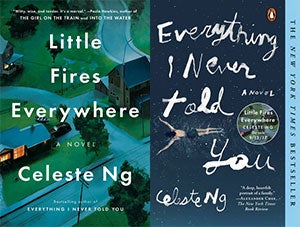 forged by blood, or by love? And perhaps most importantly: do the faults of our past determine what we deserve in the future? Be ready to be wowed by Ng’s writing — and unsettled by the mirror held up to one’s own beliefs.”
In this “Meet Our Author” interview, Celeste offers a window into her daily routines, the inspirations behind her stories, and how Penguin Press has impacted her writing career.
How would you describe your writing regimen and routines?
Right now, my writing time is scheduled around my son: when he’s at school, I’m writing. That means I’m basically at my desk (or reading or doing related work) from 9:00 until 3:00. I usually start off the day by reading over what I wrote the day before; usually I can see how to take it further, or I’m horrified and frantically get to work rewriting. As needed, I take breaks to visit the library, do research, or read other people’s books—there are few things more inspiring than seeing brilliant work fellow writers are doing. And when I get really stuck, I go for a walk: that always seems to jar things loose. Of course, throughout all this, there’s a healthy dose of Twitter for work breaks.
Where do inspirations for your book characters and storylines come from?
I’ve realized I approach writing as a psychological exercise: I’m always asking, “Why would someone do that?” If you pay attention, people are always doing things that don’t make logical sense, whether it’s as large as deciding to walk across the country or as small as picking a fight with someone they love. But there’s always a reason people do what they do. I’m interested in that emotional logic, what shapes a person and how that drives him or her to act in very specific ways. So my stories usually start with something I don’t understand—a character’s inexplicable action, or an unexpected reaction to something—and the story is my way of trying to figure out why this happened.
What elements of LITTLE FIRES EVERYWHERE do you think will resonate most strongly with readers?
Motherhood is a big theme in the novel, and one I think a lot of readers will relate to. There are mothers everywhere in this book—the mothers you’re born to, the mothers you choose, the mothers circumstances give you. The novel also raises questions about art: who gets to make it and what role does it play in a life? And of course many readers will probably flash back to their teen years as they watch Pearl and the Richardson children try to navigate their families, friendships, and first loves.
In what ways has Penguin Press impacted your writing career?
forged by blood, or by love? And perhaps most importantly: do the faults of our past determine what we deserve in the future? Be ready to be wowed by Ng’s writing — and unsettled by the mirror held up to one’s own beliefs.”
In this “Meet Our Author” interview, Celeste offers a window into her daily routines, the inspirations behind her stories, and how Penguin Press has impacted her writing career.
How would you describe your writing regimen and routines?
Right now, my writing time is scheduled around my son: when he’s at school, I’m writing. That means I’m basically at my desk (or reading or doing related work) from 9:00 until 3:00. I usually start off the day by reading over what I wrote the day before; usually I can see how to take it further, or I’m horrified and frantically get to work rewriting. As needed, I take breaks to visit the library, do research, or read other people’s books—there are few things more inspiring than seeing brilliant work fellow writers are doing. And when I get really stuck, I go for a walk: that always seems to jar things loose. Of course, throughout all this, there’s a healthy dose of Twitter for work breaks.
Where do inspirations for your book characters and storylines come from?
I’ve realized I approach writing as a psychological exercise: I’m always asking, “Why would someone do that?” If you pay attention, people are always doing things that don’t make logical sense, whether it’s as large as deciding to walk across the country or as small as picking a fight with someone they love. But there’s always a reason people do what they do. I’m interested in that emotional logic, what shapes a person and how that drives him or her to act in very specific ways. So my stories usually start with something I don’t understand—a character’s inexplicable action, or an unexpected reaction to something—and the story is my way of trying to figure out why this happened.
What elements of LITTLE FIRES EVERYWHERE do you think will resonate most strongly with readers?
Motherhood is a big theme in the novel, and one I think a lot of readers will relate to. There are mothers everywhere in this book—the mothers you’re born to, the mothers you choose, the mothers circumstances give you. The novel also raises questions about art: who gets to make it and what role does it play in a life? And of course many readers will probably flash back to their teen years as they watch Pearl and the Richardson children try to navigate their families, friendships, and first loves.
In what ways has Penguin Press impacted your writing career?
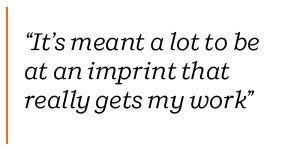 I’m unbelievably lucky to have landed at Penguin Press the first time, and am thrilled to be with them for a second book! Everyone there has been fantastic to work with, but several deserve special mention: Virginia Smith Younce made my novel better and stronger through her insightful editing. Juliana Kiyan’s deep understanding of my work and smart, tireless advocacy have gotten my books in the hands of people who championed it. The marketing team, Matt Boyd, Caitlin O’Shaughnessy, and Grace Fisher, have been both creative and enthusiastic in their promotion, and, of course, Ann Godoff and Scott Moyers’ leadership makes it all possible.
Put simply, it’s meant a lot to be at an imprint that really gets my work and knows how to help it find its audience. I’m so proud to be with Penguin Press and to get to work with everyone at Penguin. Honestly, I can’t imagine a better publishing experience.
I’m unbelievably lucky to have landed at Penguin Press the first time, and am thrilled to be with them for a second book! Everyone there has been fantastic to work with, but several deserve special mention: Virginia Smith Younce made my novel better and stronger through her insightful editing. Juliana Kiyan’s deep understanding of my work and smart, tireless advocacy have gotten my books in the hands of people who championed it. The marketing team, Matt Boyd, Caitlin O’Shaughnessy, and Grace Fisher, have been both creative and enthusiastic in their promotion, and, of course, Ann Godoff and Scott Moyers’ leadership makes it all possible.
Put simply, it’s meant a lot to be at an imprint that really gets my work and knows how to help it find its audience. I’m so proud to be with Penguin Press and to get to work with everyone at Penguin. Honestly, I can’t imagine a better publishing experience. What Debut Novelist Sophie Chen Keller Found
August 7, 2017
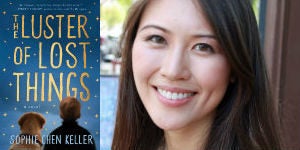 At the heart of THE LUSTER OF LOST THINGS , the first novel by Putnam author Sophie Chen Keller, is Walter Lavender, Jr., silenced by a motor speech disorder but a master of finding, a son keeping vigil, twelve years and counting, for his lost father. When the book at the root of magic served up at the family bakery, The Lavenders, vanishes, Walter, accompanied by his overweight golden retriever, journeys through New York City to find it—along the way encountering an unforgettable cast of lost souls.
At the heart of THE LUSTER OF LOST THINGS , the first novel by Putnam author Sophie Chen Keller, is Walter Lavender, Jr., silenced by a motor speech disorder but a master of finding, a son keeping vigil, twelve years and counting, for his lost father. When the book at the root of magic served up at the family bakery, The Lavenders, vanishes, Walter, accompanied by his overweight golden retriever, journeys through New York City to find it—along the way encountering an unforgettable cast of lost souls. 
Meet Our Author: Meg Howrey
March 10, 2017
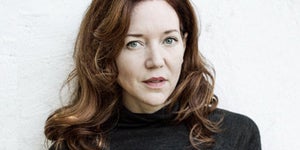 Author Meg Howrey is a former dancer who performed with the Joffrey, Eglevsky Ballet, and City Ballet of Los Angeles. She toured nationally with the Broadway production of Contact, for which she won the Ovation Award in 2001 for Best Featured Actress in a Musical. During her writing career, Meg has been the author two novels for Pantheon/Vintage, Blind
Author Meg Howrey is a former dancer who performed with the Joffrey, Eglevsky Ballet, and City Ballet of Los Angeles. She toured nationally with the Broadway production of Contact, for which she won the Ovation Award in 2001 for Best Featured Actress in a Musical. During her writing career, Meg has been the author two novels for Pantheon/Vintage, Blind
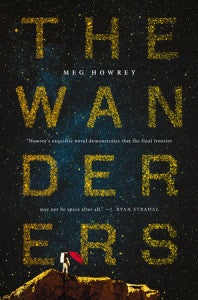 Ms. Howrey’s new book, THE WANDERERS, which goes on sale from G. P. Putnam’s Sons on March 14, has been described as “Station Eleven meets The Martian.” This brilliantly inventive novel is about three astronauts training for the first-ever mission to Mars, an experience that will push the boundary between real and unreal, test their relationships, and leave each of them—and their families—changed forever. Wonderfully imaginative, tenderly comedic, and unerringly wise, THE WANDERERS explores the differences between those who go and those who stay, telling a story about the desire behind all exploration: the longing for discovery and the great search to understand the human heart.
In this “Meet Our Author” interview, Meg takes us inside the heart of her creative life:
How would you describe your writing regimen and routines?
I alternate writing sitting at a desk with standing up at a sort of jury-rigged podium. In both places there is much gesticulation and theatrical facial expressions and mumblings. Making a book is a form of performance art. I’m a slow starter and will spend months on the first one or two chapters. Whether I’m writing two hours a day or ten, each book feels like its own particular beast and requires different regiments of feeding, care, and grooming. Books can bite or run away so you have to stay calm and be patient.
What was the genesis of and the inspirations behind your new novel, THE WANDERERS?
I read a newspaper account of a study conducted by the Russian and European space agencies to investigate the psychological effects of a long duration space mission. I thought, “Well, that’s interesting but wouldn’t what you’d feel on an actual mission to Mars be substantially different from what you’d feel in a simulator?” And then, “Possibly not, if the simulation was very good,” and also, “That would make a cool setting for a novel,” followed by, “It’s too bad I can’t write that novel since I don’t know anything about space.” So, the beast of this novel entailed a lot of research. Some of the themes I’ve tried to work on in other books are here: consciousness, ambition, the constructs of family, the problem of deciding what is real, and what “real” means.
How have you been able to find the time and the creative energy to achieve success as an author, dancer and actress?
Ms. Howrey’s new book, THE WANDERERS, which goes on sale from G. P. Putnam’s Sons on March 14, has been described as “Station Eleven meets The Martian.” This brilliantly inventive novel is about three astronauts training for the first-ever mission to Mars, an experience that will push the boundary between real and unreal, test their relationships, and leave each of them—and their families—changed forever. Wonderfully imaginative, tenderly comedic, and unerringly wise, THE WANDERERS explores the differences between those who go and those who stay, telling a story about the desire behind all exploration: the longing for discovery and the great search to understand the human heart.
In this “Meet Our Author” interview, Meg takes us inside the heart of her creative life:
How would you describe your writing regimen and routines?
I alternate writing sitting at a desk with standing up at a sort of jury-rigged podium. In both places there is much gesticulation and theatrical facial expressions and mumblings. Making a book is a form of performance art. I’m a slow starter and will spend months on the first one or two chapters. Whether I’m writing two hours a day or ten, each book feels like its own particular beast and requires different regiments of feeding, care, and grooming. Books can bite or run away so you have to stay calm and be patient.
What was the genesis of and the inspirations behind your new novel, THE WANDERERS?
I read a newspaper account of a study conducted by the Russian and European space agencies to investigate the psychological effects of a long duration space mission. I thought, “Well, that’s interesting but wouldn’t what you’d feel on an actual mission to Mars be substantially different from what you’d feel in a simulator?” And then, “Possibly not, if the simulation was very good,” and also, “That would make a cool setting for a novel,” followed by, “It’s too bad I can’t write that novel since I don’t know anything about space.” So, the beast of this novel entailed a lot of research. Some of the themes I’ve tried to work on in other books are here: consciousness, ambition, the constructs of family, the problem of deciding what is real, and what “real” means.
How have you been able to find the time and the creative energy to achieve success as an author, dancer and actress?
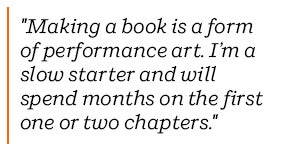 A thing about dance is you start so young you can have had a ten-year career by the time you’re in your mid-twenties, especially if you don’t go to college, which I didn’t. The acting really came out of the dancing—every once in a while somebody needed a ballet dancer who actually wanted to speak, and there weren’t that many of us. (Basically, there was the really beautiful one, the one who could also sing, and me.) Whatever else I was doing I was always, always reading, and trying to write came out of that. With all these things—dancing, acting, writing—I never feel that I’ve arrived. I’m always squinting at goalposts.
You are among a handful of Penguin Random House authors whose books have been published by multiple imprints, in your case Pantheon/Vintage, Penguin and Putnam. How has this experience helped shape your writing career?
An accurate reckoning in my “Acknowledgements” section would run to twenty pages. THE WANDERERS exists because of the generosity of Shelley Wanger and everyone at Pantheon/Vintage, and Carolyn Carlson and many delightful Penguins, and now Tara Singh Carlson and a fantastic team at Putnam. Through five books I’ve been reinventing myself, and these people have given me the space to do it. There aren’t enough thank you cards.
A thing about dance is you start so young you can have had a ten-year career by the time you’re in your mid-twenties, especially if you don’t go to college, which I didn’t. The acting really came out of the dancing—every once in a while somebody needed a ballet dancer who actually wanted to speak, and there weren’t that many of us. (Basically, there was the really beautiful one, the one who could also sing, and me.) Whatever else I was doing I was always, always reading, and trying to write came out of that. With all these things—dancing, acting, writing—I never feel that I’ve arrived. I’m always squinting at goalposts.
You are among a handful of Penguin Random House authors whose books have been published by multiple imprints, in your case Pantheon/Vintage, Penguin and Putnam. How has this experience helped shape your writing career?
An accurate reckoning in my “Acknowledgements” section would run to twenty pages. THE WANDERERS exists because of the generosity of Shelley Wanger and everyone at Pantheon/Vintage, and Carolyn Carlson and many delightful Penguins, and now Tara Singh Carlson and a fantastic team at Putnam. Through five books I’ve been reinventing myself, and these people have given me the space to do it. There aren’t enough thank you cards. Meet Our Author: Ottessa Moshfegh
January 24, 2017
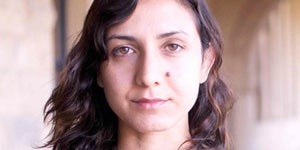 Ottessa Moshfegh’s debut novel EILEEN, published by Penguin Press, was one of the literary events of 2015. Garlanded with critical acclaim, it won the PEN/Hemingway Award for Debut Fiction, was nominated for a National Book Critics Circle Award, was shortlisted for the Man Booker Prize, and was named a book of the year by The Washington Post and San
Ottessa Moshfegh’s debut novel EILEEN, published by Penguin Press, was one of the literary events of 2015. Garlanded with critical acclaim, it won the PEN/Hemingway Award for Debut Fiction, was nominated for a National Book Critics Circle Award, was shortlisted for the Man Booker Prize, and was named a book of the year by The Washington Post and San
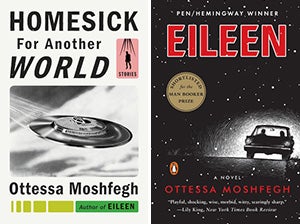 HOMESICK FOR ANOTHER WORLD, on sale now from Penguin Press, is the rare case where an author’s short story collection is, if anything, more anticipated than her novel. And for good reason. There’s something eerily unsettling about Ottessa’s stories, something almost dangerous, while also being delightful, and even laugh-out-loud funny. Her characters are all unsteady on their feet in one way or another; they all yearn for connection and betterment, though each in very different ways, but they are often tripped up by their own baser impulses and existential insecurities. HOMESICK FOR ANOTHER WORLD is a master class in the varieties of self-deception across the gamut of individuals representing the human condition.
In this Meet Our Author Igloo interview, Ottessa takes us inside her world:
How would you describe your writing regimen and routines?
Obsessive and neurotic and captivating. I wake up, I work, I dilly dally, work, take out the trash, work, pace around, eat, work, shower, work, read, work, go for a walk, call people, work, eat, work, sleep. Toward the end of writing a book, I often sleep with my computer under my pillow…
What differentiates your approach to conceiving a novel as compared with your short stories?
The motivation to write a short story often comes from an abstract, mysterious noise in my head, and I can take my time concentrating on that sound and experimenting with what words, voice, characters, and narrative movements are being described by the music in my mind. Writing a novel is that, plus a million pounds of pressure at my back, loaded with questions about how my life is being reflected in this writing process, and what I want to learn and say to the world. So, novels are more prolonged and intense journeys, although they can start out as playfully as a story.
HOMESICK FOR ANOTHER WORLD, on sale now from Penguin Press, is the rare case where an author’s short story collection is, if anything, more anticipated than her novel. And for good reason. There’s something eerily unsettling about Ottessa’s stories, something almost dangerous, while also being delightful, and even laugh-out-loud funny. Her characters are all unsteady on their feet in one way or another; they all yearn for connection and betterment, though each in very different ways, but they are often tripped up by their own baser impulses and existential insecurities. HOMESICK FOR ANOTHER WORLD is a master class in the varieties of self-deception across the gamut of individuals representing the human condition.
In this Meet Our Author Igloo interview, Ottessa takes us inside her world:
How would you describe your writing regimen and routines?
Obsessive and neurotic and captivating. I wake up, I work, I dilly dally, work, take out the trash, work, pace around, eat, work, shower, work, read, work, go for a walk, call people, work, eat, work, sleep. Toward the end of writing a book, I often sleep with my computer under my pillow…
What differentiates your approach to conceiving a novel as compared with your short stories?
The motivation to write a short story often comes from an abstract, mysterious noise in my head, and I can take my time concentrating on that sound and experimenting with what words, voice, characters, and narrative movements are being described by the music in my mind. Writing a novel is that, plus a million pounds of pressure at my back, loaded with questions about how my life is being reflected in this writing process, and what I want to learn and say to the world. So, novels are more prolonged and intense journeys, although they can start out as playfully as a story.
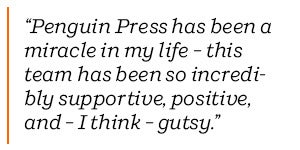 Where do inspirations for your characters and storylines come from?
They come from my life experiences, overheard conversations, dreams, the imagination, the ether…
In what ways has Penguin Press impacted your writing career?
Penguin Press has been a miracle in my life – this team has been so incredibly supportive, positive, and – I think – gutsy. I tell everyone how blessed I feel to have a publisher that understands my work and sees its value today and the potential for the future.
Where do inspirations for your characters and storylines come from?
They come from my life experiences, overheard conversations, dreams, the imagination, the ether…
In what ways has Penguin Press impacted your writing career?
Penguin Press has been a miracle in my life – this team has been so incredibly supportive, positive, and – I think – gutsy. I tell everyone how blessed I feel to have a publisher that understands my work and sees its value today and the potential for the future. Popular Company News
PW’s Spring 2026 Writers to Watch Featuring PRH Authors
January 23, 2026
Publishers Weekly recently named several Penguin Random House authors to its Spring 2026 Writers to Watch list, recognizing a standout group of voices whose debuts are…
Streaming Now on Netflix: PEOPLE WE MEET ON VACATION, Emily Henry’s #1 Bestseller
January 16, 2026
Netflix’s film adaptation of the #1 New York Times bestseller PEOPLE WE MEET ON VACATION by Emily Henry (published by Berkley in 2021, with subsequent editions,…
NYT’s Most Anticipated Movie Adaptations: PEOPLE WE MEET ON VACATION and More!
January 9, 2026
Still deciding what to add to your TBR this year? The New York Times just rounded up a list of books to read before they hit…
Spotlighting Our 2026 ALA Adult Award Winners and Honorees
January 29, 2026
This week, the American Library Association kicked off the 2026 literary awards season with the announcement of their adult book awards, including the Andrew Carnegie Medals,…
Vonnegut Estate, Authors, and Student Plaintiffs Take Utah to Court Over the Freedom to Read
January 7, 2026
On Tuesday, January 6, the American Civil Liberties Union of Utah Foundation, Inc. (ACLU of Utah) filed the first major case defending the freedom to read…
WaterBrook Marks 30th Anniversary in 2026 with Yearlong Celebration
January 8, 2026
WaterBrook, the flagship imprint of Penguin Random House Christian Publishing Group, is celebrating its 30th anniversary in 2026 with a yearlong campaign highlighting the imprint’s history,…
RHCB Authors and Illustrators Receive Accolades from the ALA Youth Media Awards!
January 27, 2026
The American Library Association (ALA) announced the 2026 Youth Media Awards on Monday, January 26 at the Hilton Chicago Hotel, and several Random House Children’s Books…
2026 Book Cover Designers to Watch Featuring Two PRH Designers
January 16, 2026
We love seeing book cover design get its moment, especially when it comes to our designers! In a recent OurCulture article highlighting seven designers worth following…
Our Upcoming Author Events | January 5-9, 2026
January 5, 2026
The Penguin Random House Communications team invites you to discover some of the Penguin Random House Author Events we’re looking forward to this week! Every Monday, a curated selection of…
